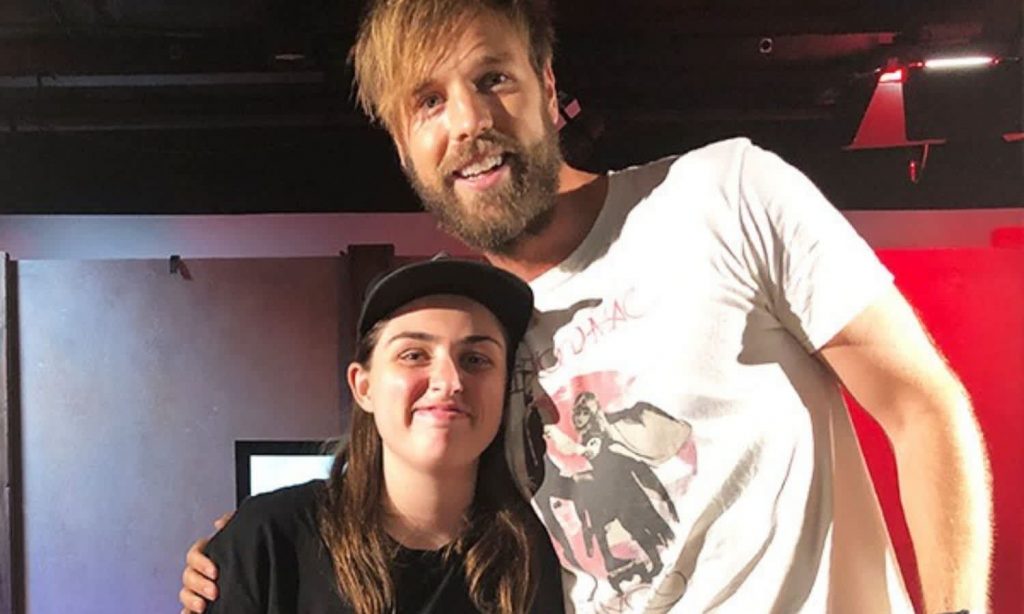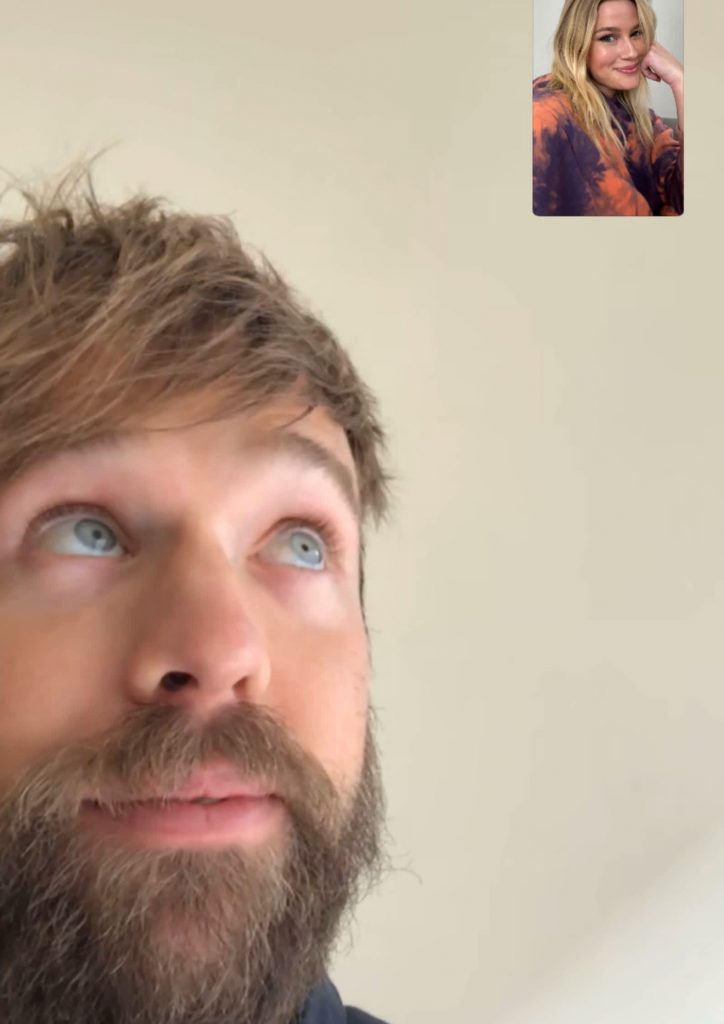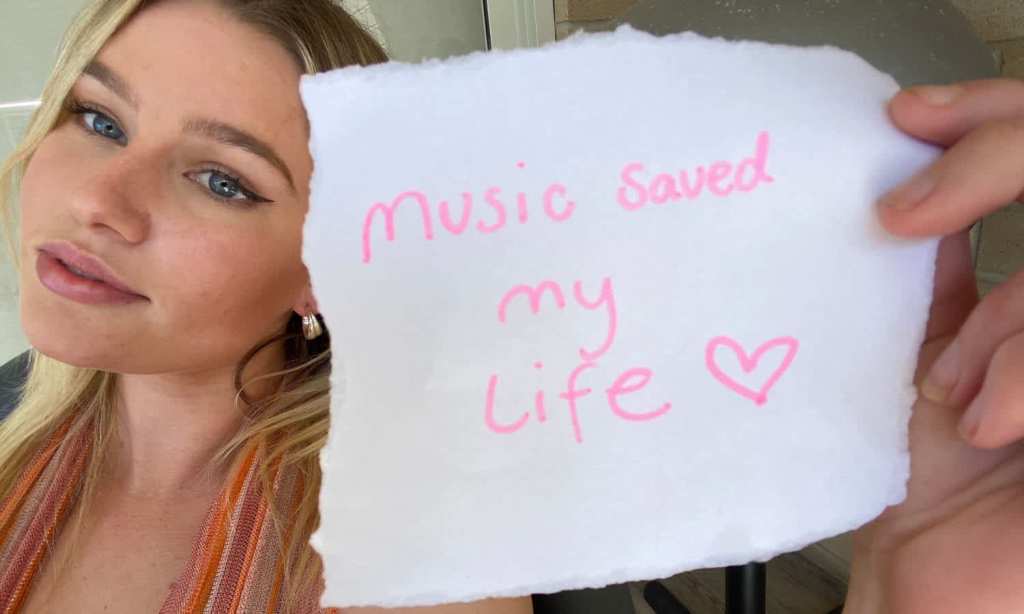TV VJ Danny Clayton has been working in the music industry since he was 16-years-old and was cast as a teen host on the now-defunct Channel V.
Now 34, he is the host of the podcast, Music Saved Me, an initiative through Musicians Making A Difference (MMAD) — an Australian charity which exists to change young lives through music.
“The podcast is fantastic at breaking down what we would assume we know about musicians and pop stars,” Clayton said in an interview with The Latch.
“I think that when we see people on our television screens and on the stages of festivals and we hear them on the radio, we paint a picture for ourselves.”
While the experience of interviewing artists like Conrad Sewell, GRAACE and Illy are
invaluable, it’s being a “mad ally” of MMAD that is most rewarding.
“There are so many people who have no idea how brilliant they are,” Clayton said. “MMAD opens the doors for those people because it actually lets them know how gifted they are.”
Here, Clayton talks to The Latch about how MMAD saved one man from the brink of suicide, how you can get involved with the organisation and talks about some of the best conversations he has had with some of Australia’s biggest names in music.

Anita Anabel: Hi Danny, let’s talk about Musicians Making a Difference (MMAD) and your involvement with it.
Danny Clayton: I was introduced to MMAD a little while ago, and it is an incredible organisation which provides mentorships to young people who might be doing it rough. They might be struggling in a variety of different areas. They might come through the foster system or they’re not doing well at school or something like that.
MMAD takes care of these young people and puts them into really incredible mentorships in the music industry. That might mean connecting them with some great producers or sound engineers and it really makes them realise that there is so much more in the music industry that they can get involved in.
AA: It’s such a great initiative.
DC: Yeah, it is. I guess it gives them all a chance to express themselves using music and using music as a tool to tackle some of the challenges that they might be facing.
I really love it because the organisation introduced me to a bunch of really lovely young humans who all had wild amounts of potential, and none of them realised it. Even to this day, I’m working with a girl who has this incredible voice and I’m still working with her now, connecting her with world-class producers and she has been lending her vocals to some of Australia’s premier musicians and we’ll be hearing a lot about her very, very soon.
AA: So, you’re hosting the aligning podcast, Music Saved Me. It’s such a cool concept. What is different about this podcast and why should we listen? And are there any guests that really stick out to you?
DC: The podcast is fantastic at breaking down what we would assume we know about musicians and pop stars. I think that when we see people on our television screens and on the stages of festivals and we hear them on the radio, we paint a picture for ourselves. We think that they have this idyllic life and Music Saved Me pulls back the curtain.
It really shows that these people who we admire and we love to go through the same struggles and sometimes worse than we do.
AA: What are some of the best conversations you’ve had?
DC: Some of the conversations that I’ve loved the most are the ones that are also the most heartbreaking.
I got really deep with GRAACE when she was talking about the loss of her father and how she used music to kind of pull her out of this hole. She used music to save her, literally.
Conrad Sewell was also just an incredible person to talk to because he’s had international success, toured the world, and he’s had it at such a young age. It was really interesting seeing how he managed to deal with the pressures of being an internationally in-demand artist. He’s gone through some public struggles and he was talking about how he solved them privately using music. I think that the real drawcard to this show is the way that young people can use these stories to apply it to their lives and apply it to their struggles and take a different approach to get themselves out of a rut.

AA: I love on the website that it says that “MMAD can open doors to opportunities that will help you go and find direction as a person and as an aspiring artist”.
Why do you think, as someone who works in the business, why do you think that’s important? And why do you think it’s so important to nurture young talent?
DC: There are so many people who have no idea how brilliant they are. There are so many people who have unique, incredible voices. So many people who are the most amazing guitar players and all these people can sometimes just be kind of not noticed, these people could be completely forgotten because they don’t understand how incredible they are. MMAD opens the doors for those people because it actually lets them know how gifted they are.
This vocalist I was telling you about, she had no plans on being a singer until she walked into MMAD and they helped her connect with other musicians, with people like myself, who were really passionate about music. And it was the first stepping stone to bring her into an industry which can sometimes be very difficult to crack.
Music is one of those things, which once you find success, it brings success to your community. So an individual’s success in the Australian music industry is a success for the entire industry.
“An individual’s success in the Australian music industry is a success for the entire industry.”
AA: I find it really interesting when you say that they didn’t know that they had this talent and then they walked through the doors and then all of a sudden they blow everybody’s minds. Is it also that the reason that they often haven’t been able to have these opportunities is that they just didn’t know where to go, or they didn’t have the opportunities growing up?
DC: Well, definitely. Sometimes when you’re in school, when you’re in the conventional system, you don’t really consider a career in music. You consider getting, I guess, a normal job and people have this idea of what a normal job should be, the typical jobs. And then music is often considered as a recreational pursuit. But when these people are recognised by an organization like MMAD, they realise that it’s not just something to do for fun. It could be their career, it could be their life, it could be their life pursuit.
The characters which we have the privilege to meet all have incredible stories about how music personally saved them. One particular gentleman had the most breathtaking story. He said that he had written his suicide letter and it was ready to go until he received the phone call from MMAD. And he thought, oh, I’ll put that aside for now and I’ll go on this camp and then I’ll go back to my plan of placing my suicide note. And he went to the camp and it changed his mind.
So, even if he is the only person that MMAD touched, that MMAD had an effect on, then mission completed. They’ve done a great job.
AA: In regards to your story, you had an opportunity from high school, which is amazing, but was there anything like this for you when you were younger? Or would you have liked something like this, like a mentor program when you first started?
Definitely. I mean, I wanted to work as a musician and I realised quite early that I had absolutely no ability to make music. So I wanted to be around music. So I aimed to be a rock and roll photographer, which then led to me becoming a music television presenter.
But I think that when you’re at school, there’s that looming feeling that you should know exactly what you’ll do with the rest of your life as you finish year 12. And God knows, the most incredible people that I know my age now, and they’re still figuring out that question.
And young people feel that pressure and it can cause huge amounts of emotional weight on them. And if they had someone just to tell them that there are other avenues, there are other ways to be happy and feel fulfilled. I mean, if that was around when I was young, it would have been great. There’s an opportunity here to really take care of a generation of young people who might not fit into the regular pathways that we set for teenagers.
“There’s an opportunity here to really take care of a generation of young people who might not fit into the regular pathways that we set for teenagers.”
AA: If we want to help as a community, how can we help MMAD?
DC: MMAD is a really incredible organization and it doesn’t take too much research to figure out how much they are doing for the community. It’s worthwhile listening to the podcast, which you can find on all the great podcast streaming services.
Just head over to the MMAD website and reading about all the great programs that they’re offering young people. And it was a real eye-opener working with them, and I would consider myself an ally. A mad ally.
For more information on MMAD, head to their website.
If you or anyone you know is struggling and needs support, call Kids Helpline on 1800 55 1800 or Lifeline on 13 11 14, both of which provide trained counsellors you can talk with 24/7. You can also speak with someone confidentially at Headspace by calling 1800 650 890 or chat online here.
https://open.spotify.com/episode/2HzEutooGVFXIi4WgwAsJX?si=qJO5-dR0SOmT4gq1swHIug







